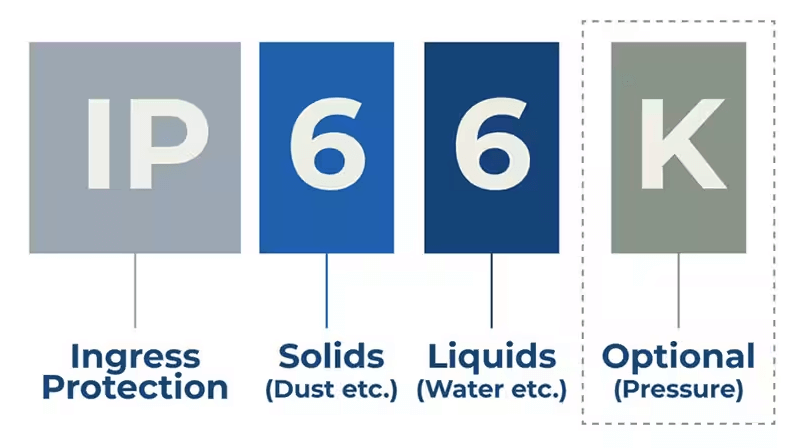IPR (Ingress Protection Rating) Explanation
The IPX rating is part of the International Protection Rating system, specifically used to evaluate the protection capability of electronic devices and other products against water and dust.
- Purpose: The IPX rating aims to provide a standardized way to measure a device’s resistance to water.
- System Composition: A complete IP rating consists of two numbers, e.g., IP67.
The first number indicates the dust protection level,the second number (the X in IPX) indicates the water protection level. - Application Range: This system is widely used in various electronic products, such as mobile phones, smartwatches, outdoor equipment, kitchen appliances, etc.
- Testing Standards: Each IPX rating has specific testing standards and conditions to ensure the product meets its claimed waterproof ability.
- Consumer Guide: IPX ratings help consumers understand a product’s waterproof capability, enabling more informed purchasing decisions.
- Manufacturer Guide: For manufacturers, IPX ratings provide clear goals and standards, guiding product design and production.
- Importance: As electronic devices become more ubiquitous, waterproof performance becomes increasingly important, especially for devices frequently used outdoors or in humid environments.
The IPX rating system provides a unified standard for consumers and manufacturers to evaluate and describe a product’s water and dust resistance performance.
| Protection | Dust Rating | Water Rating | Pressure |
|---|---|---|---|
| IP | 6 | 6 | K |
Combining dust and water ratings, we can get a complete IP rating. For example:
- IP67: 6 indicates completely dustproof, 7 indicates can be submerged in 1 meter deep water for 30 minutes
- IP54: 5 indicates dust-protected (allows small amount of dust entry), 4 indicates splash-proof
This classification system provides a standard for consumers and manufacturers to evaluate a device’s environmental protection capability.

IPX Waterproof Rating Differences and Explanation
| IPX Rating | Waterproof Level | Description |
|---|---|---|
| IPX-0 | No water protection | No water protection at all |
| IPX-1 | Drip-proof | Protected against vertically falling water drops |
| IPX-2 | Drip-proof when tilted | Protected against water drops falling at up to 15 degrees |
| IPX-3 | Spray-proof | Protected against water spraying up to 60 degrees |
| IPX-4 | Splash-proof | Protected against water splashing from all directions |
| IPX-5 | Jet-proof | Protected against low-pressure water jets (12.5 liters/minute) |
| IPX-6 | Powerful jet-proof | Protected against powerful water jets (100 liters/minute) |
| IPX-7 | Short-term immersion | Can be immersed in 1 meter deep water for 30 minutes |
| IPX-8 | Long-term immersion | Can be immersed in water deeper than 1 meter for a long time (specific depth specified by manufacturer) |
| IPX-9K | High-temperature high-pressure jet-proof | Can resist high-temperature (80°C) and high-pressure (8-10 MPa) water jet |
IPX-9K is a special rating, mainly used for industrial equipment that needs to withstand high-temperature and high-pressure cleaning, such as food processing equipment or automotive parts.
From IPX-0 to IPX-9K, waterproof capability gradually increases, suitable for different usage environments and needs. Although IPX-9K is more stringent in some aspects than IPX-8, it doesn’t mean it’s “better” than IPX-8 in all situations. Choosing the appropriate waterproof rating should be based on the specific usage environment and requirements of the product.
IP Dust Protection Rating Differences and Explanation
| Dust Protection Rating | Protection Level | Description |
|---|---|---|
| IP0X | No protection | No special protection |
| IP1X | Large particle protection | Prevents solid objects larger than 50mm in diameter from entering |
| IP2X | Medium particle protection | Prevents solid objects larger than 12.5mm in diameter from entering |
| IP3X | Small particle protection | Prevents solid objects larger than 2.5mm in diameter from entering |
| IP4X | Particle protection | Prevents solid objects larger than 1mm in diameter from entering |
| IP5X | Dust-protected | Prevents most dust from entering, small amount of entry doesn’t affect device operation |
| IP6X | Completely dustproof | Completely prevents dust from entering |
This table summarizes the dust protection capability differences from IP0X to IP6X. From IP0X with no dust protection at all, to IP6X with complete dust protection, the dust resistance capability gradually increases.
